Memorial Day Weekend
In honor of Memorial Day, we will be stepping away from the computers on Monday. We'll see you again Tuesday, May 29.
In honor of Memorial Day, we will be stepping away from the computers on Monday. We'll see you again Tuesday, May 29.
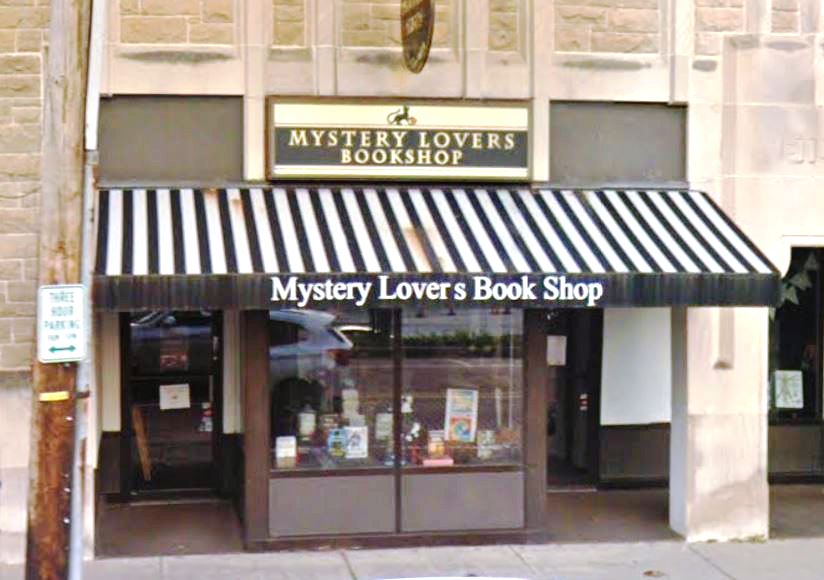
"First of all, we'd like to thank you for all of your support," wrote Sacco. "Trevor and I always talk about how lucky we are to be a part of two great communities--the Oakmont community, which we are proud to call home, and the literary community--especially here in Pittsburgh. We have received endless support, words of encouragement, and have enjoyed our time with all of you!"
Thomas and Sacco said that their only requirement for a successor is that they be "passionate about books and the Mystery Lovers community," and assured customers that while the search for a buyer is in progress, "not much will change and all events will take place as scheduled."
Mystery Lovers was founded in 1990 by Richard Goldman and Mary Alice Gorman, who sold the store in 2012 to Laurie Stephens, a bookseller and former librarian. In 2015, Sacco and Thomas purchased the store from Stephens. In addition to mysteries and thrillers, the store sells nonfiction books and has a strong children's section.
For more information, contact Natalie Sacco at natalie@mysterylovers.com.
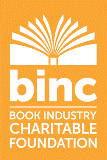 The Book Industry Charitable Foundation has named the 27 recipients who will receive $109,000 in education scholarship funding as part of Binc's Higher Education Scholarship Program. They were selected from 159 applicants, including bookstore owners, booksellers, former Borders Books employees or their dependents. A complete list of recipients, who represent 23 stores in 21 states, can be found here.
The Book Industry Charitable Foundation has named the 27 recipients who will receive $109,000 in education scholarship funding as part of Binc's Higher Education Scholarship Program. They were selected from 159 applicants, including bookstore owners, booksellers, former Borders Books employees or their dependents. A complete list of recipients, who represent 23 stores in 21 states, can be found here.
Included among them were two $10,000 scholarships, 24 $3,500 scholarships, and one $5,000 Karl Pohrt Memorial Scholarship, which is granted to an independent bookstore employee candidate who has overcome learning adversity or is a non-traditional student. Since 2001, the foundation has supported the educational goals of more than 600 booksellers, granting over $1.9 million in awards.
"Booksellers are people who make the world a better place," said Binc executive director Pam French. "We hope that by providing them with the opportunity to learn and grow through higher education, we are helping them change the world even more. Congratulations to all of the college scholarship winners!"
Binc received an outpouring of thank-you notes and letters following the scholarship announcement. Hannah Richardson of Malaprop's Bookstore/Café , Asheville, N.C., said, "I cannot express how incredibly grateful I am to you and the Binc team for offering me this scholarship. As you well know, no one pursues a career in bookselling or education with the ultimate goal of having deep pockets, but the economic challenge to make this happen can be overwhelming. Thank you for helping to ease this burden, supporting my education and making me feel like an important member of the book community."
Former Borders employee and scholarship winner Jennifer Rojas cited Binc's origins as the Borders Group Foundation in her thank-you note: "When Borders was still open, I witnessed how the foundation supported my employees with both scholarships and during times of financial difficulties. I am incredibly grateful that the Binc Foundation has been able to continue supporting current and former booksellers throughout the industry."
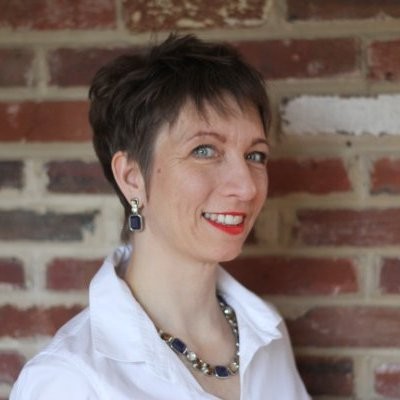 |
|
| Helen Hendricks | |
"We're seeking out books that can represent all kids," said Helen Hendricks, founder of Stories Like Me, a multicultural and multilingual children's bookstore that will make its debut as an online-only store later this year. "We've got a mission to fulfill that."
While her goal is eventually to open a traditional bricks-and-mortar store in the Fairfax, Va., area, Hendricks will begin by selling new books exclusively online. She plans to carry children's titles in English, Spanish, French and German, with Arabic and Korean added at some point, and will focus on a single initial genre: fairy tales.
Hendricks explained that she and her two daughters, Elsie Campbell Hendricks and Imogen Campbell Hendricks, with whom she registered the Stories Like Me LLC brand, chose that genre deliberately, because many folk and fairy tales began as parts of oral traditions around the world and many of the stories have a "timeless quality" to them that helps transcend cultural boundaries.
"The books need to be both mirrors and windows," Hendricks said. "Every child should be able to see himself or herself reflected, but also have a window into another culture and another world."
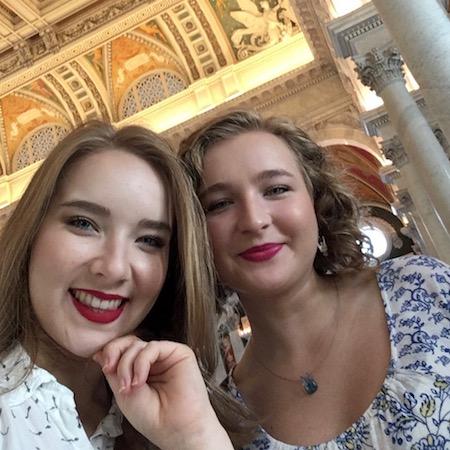 |
|
|
Elsie Campbell Hendricks and Imogen Campbell Hendricks |
|
When it comes to selecting the initial list of fairy tales that Stories Like Me will stock, Hendricks said that it's been a "labor of love" on the part of herself and her daughters, one of whom is a linguist and one of whom is a writer and editor. With their help, she's done extensive online research to find titles that match their set of criteria, which include diverse books that are beautifully designed and illustrated. And once she's found titles, she's been working on how to source them, which in some cases might be easy through U.S. distributors and wholesalers, or might require her to order direct from foreign publishers.
"People have said to me, 'you can't possibly compete with Amazon,' " recounted Hendricks. "We're not going to try to compete with Amazon. We're going to sell a very specific genre and really curate a collection of books that will reflect every child."
Hendricks pointed out that although the store's primary audience will be children, there are plenty of adults "who really appreciate the genre itself," and might want to buy them for their own collections. She said: "It's not just children who love beautiful books and writing and illustrations."
The exact shape of the opening inventory is yet to determined. Hendricks said she isn't sure whether the store will have many versions of five or so fairy tales or around 30 fairy tales with a handful of versions each. The inventory also won't consist exclusively of classic fairy tales; she pointed to The Bravest Princess: A Tale of the Wide-Awake Princess by E.D. Baker as a title she'll stock from the beginning. And once the online store is up and running, Hendricks hopes to do pop-up events and partner with various organizations in the Fairfax community.
"It matters hugely to me that we do this in the community," she said.
When asked for how long she's wanted to open a bookstore, Hendricks replied by saying, "30 years," and went on to explain that several things came together at once that inspired her to start a bookstore now and also have its focus be on diverse children's books. The first was that with one of her daughters just graduated from college and the other currently in college, she felt that it was time to do something meaningful for the Fairfax community and really "put down roots."
The second was that as part of her day job as a project manager for a national education nonprofit, Hendricks has been involved in a year-long study on diversity, equity and inclusion in education, the results of which have "opened her eyes" in such a way that she feels "impelled to take action." And finally, her eldest daughter wrote her thesis on fairy tales, looking at stories that have been translated across three languages. Discussing the "folkloric basis" of fairy tales with her daughter, she said, got her "really inspired."
Hendricks expects that as the store grows, she'll gradually expand the inventory, but stressed that "it will always be curated through the lens of diversity, equity and inclusion." --Alex Mutter
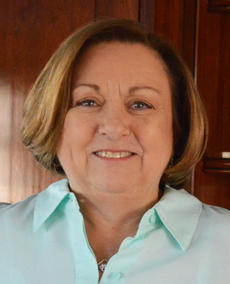 |
|
| Sharon Ritchie | |
Sharon Ritchie, owner of Chapters Bookshop & Wine Cellar in Galax, Va., is joining the Galax City Council, effective July 1, after a recent local election, Bookselling This Week reported. When she announced earlier this spring that she was running for the council, Ritchie told the Galax Gazette: "I've run my own business for 21 years now. I feel like I can bring things to the council and the city--some ideas to help grow business. I think the city needs some help with economic development and business growth....
"I think the dream's always been to have a big company come in. I just don't think that's going to happen. These aren't the days of the Hanes [textile] plant. So I think small businesses are the way to go. If we can find good, viable businesses to be into town, it'll be the saving grace of us. If you think of the businesses we have in town now, most everybody in town works for a small business. I think finding viable businesses who will come in town and stay open, will employ a lot of people, is the way to go."
Chapters Bookshop was recently named one of the best bookstores in the southwest region of the state by Virginia Living. "With a strong focus on customer service and a commitment to excellence, we believe the store's reputation as not just a place to shop but as a gathering place for locals and travelers has helped us become a downtown Galax destination," said Ritchie.
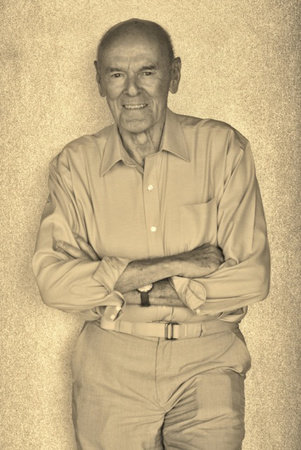 |
|
| Richard Peck (photo: Sonya Sones) |
|
Richard Peck, a prolific, award-winning author of historical and contemporary children's books and YA novels, died May 23. He was 84. Peck's literary career spanned 45 years and included 35 novels for young people, four novels for adults, a short story collection, a picture book, and two memoirs. His latest book, The Best Man, published in 2016, received a Boston Globe-Horn Book Award Honor.
In 2001, Peck won the Newbery Medal for his novel A Year Down Yonder. The prequel, A Long Way from Chicago, was a Newbery Honor book and a finalist for the National Book Award. His novel The River Between Us was also an NBA finalist. Among Peck's many honors were an Edgar Allan Poe Award, the ALA's Margaret A. Edwards Award, the Scott O'Dell Award for Historical Fiction, the Anne V. Zarrow Award for Young Readers, and the Dorothy Canfield Fisher Children's Book Award. In 2002, he received a National Humanities Medal from President Bush.
Peck's first YA novel, Don't Look and It Won't Hurt, was published in 1972 and later adapted into the film Gas Food Lodging. His books include A Year Down Yonder, A Season of Gifts, The Teacher's Funeral, Fair Weather, Here Lies the Librarian, and On the Wings of Heroes.
Earlier this year, when Avid Bookshop, Athens, Ga., withdrew from a book fair at an area private school after the administration requested that The Best Man, along with all other books featuring "objectionable" content, be removed from display, Peck wrote directly to Avid, saying: "Just when I thought my book was being taken entirely too calmly, you at Avid took your principled stand. You prove all sorts of points: that an attack upon one book is an attack upon all; that an independent bookstore has all sorts of supple strength that the frightened school and the vast and unlocal chain bookstores don't have.
"I thank you for not knuckling under and in the hope that your well-timed actions will inspire other stores and provide any number of teachable moments in classrooms far from Athens. I thank you as the former teacher I was. I thank you in the names of all the gay members of the book banners' extended families."
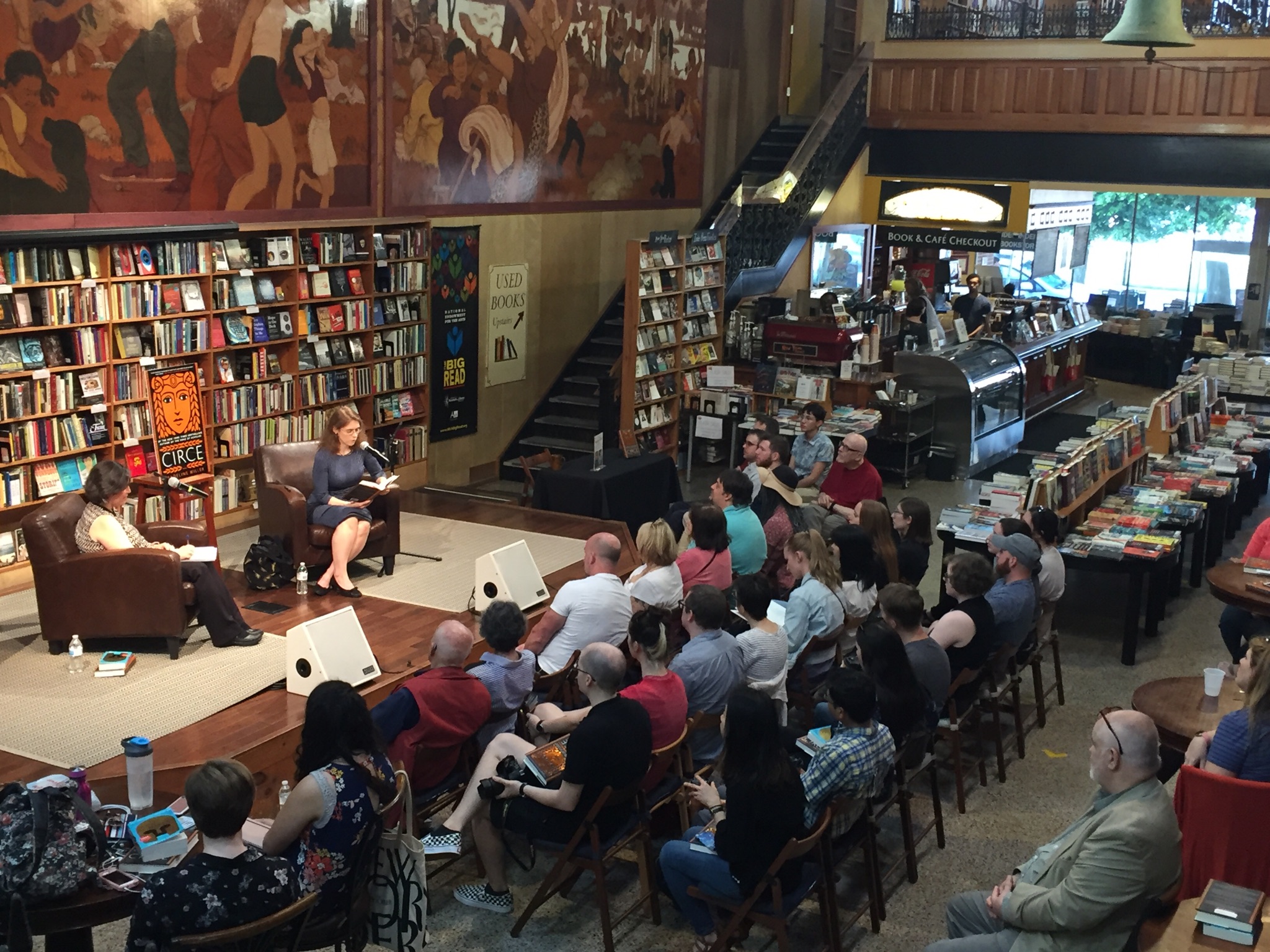 On Wednesday, Midtown Scholar Bookstore, Harrisburg, Pa., hosted Madeline Miller, author of Circe (Little, Brown), in conversation with store owner Catherine Lawrence.
On Wednesday, Midtown Scholar Bookstore, Harrisburg, Pa., hosted Madeline Miller, author of Circe (Little, Brown), in conversation with store owner Catherine Lawrence.
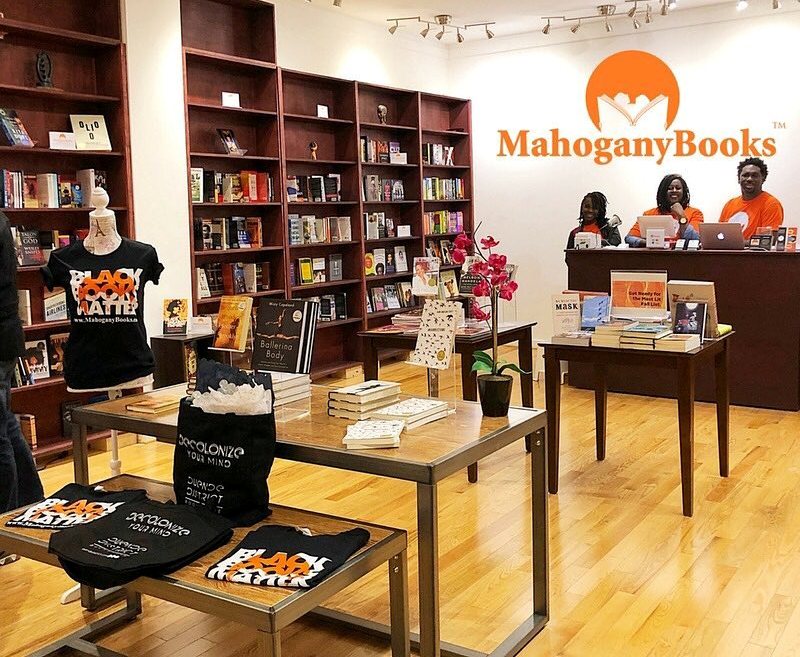 "Culture and community have always been who we are," Ramunda Young, co-owner of MahoganyBooks in Washington, D.C., told Vanity Fair. The bookstore began online and opened its first bricks-and-mortar shop late last year in Anacostia, becoming "the predominantly black neighborhood's first in more than 20 years--a fact Ramunda herself calls 'unfathomable' in what is widely considered the country's most literate city."
"Culture and community have always been who we are," Ramunda Young, co-owner of MahoganyBooks in Washington, D.C., told Vanity Fair. The bookstore began online and opened its first bricks-and-mortar shop late last year in Anacostia, becoming "the predominantly black neighborhood's first in more than 20 years--a fact Ramunda herself calls 'unfathomable' in what is widely considered the country's most literate city."
Ramunda and her husband, Derrick, are dedicated to providing their community with access to books "for, about, and by the people of the African Diaspora."
Vanity Fair wrote that "in a city that lives and breathes politics, the books on the shelves serve as a natural conversation spark, and 'we encourage discourse,' Derrick says. Recently, Ramunda was in the middle of what she describes as a 'heavily politically charged conversation' with a customer, sotto voce. Suddenly the woman stopped herself mid-sentence. 'Wait, I don't have to whisper,' she said. 'I'm at home.' "
At HarperCollins:
Alison Smith has been promoted to director, international sales, closed markets (Canada, U.K., Australia, New Zealand, South Africa and India). She joined HarperCollins in 2013 as sales manager for Latin America and the Caribbean, selling both HarperCollins U.S. and HarperCollins U.K. titles. In 2016, she was promoted to associate sales director, responsible for all HarperCollins U.S. sales in the open market.
Julianna Wojcik has been promoted to the newly created position of assistant manager for the Global Publishing Program.
Effective June 1, Abrams will distribute Obvious State, a studio that creates original art and gift items inspired by classic literature, philosophy, and poetry. Its art prints, paper goods, totes and mugs are crafted in the U.S. and printed on fine papers and materials. The company was founded by husband-and-wife team Nichole and Evan Robertson in 2011.
Evan Robertson called Abrams "a publisher we've long revered and with whom we share aesthetic sensibilities and an affinity for books, design, and literary culture."
"With our expertise selling illustrated books as well as our own gift and stationery line, we believe that we can be quite successful expanding the distribution of Obvious State's highly curated products," Abrams president and CEO Michael Jacobs said. "Our two companies share a love for words and beautiful objects."
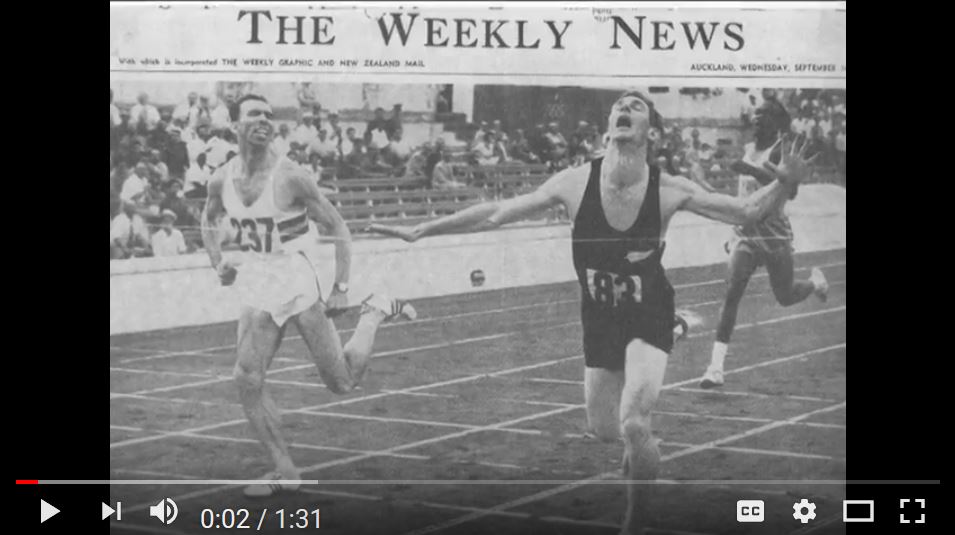
Today:
Fresh Air: the second part of a two-part retrospective devoted to the late Philip Roth, who appeared on the show several times.
Sunday:
Face the Nation: James R. Clapper, author of Facts and Fears: Hard Truths from a Life in Intelligence (Viking, $30, 9780525558644). He will also appear on CBS Sunday Morning.
Monday:
Here & Now: Patrick K. O'Donnell, author of The Unknowns: The Untold Story of America's Unknown Soldier and WWI's Most Decorated Heroes Who Brought Him Home (Atlantic Monthly Press, $27, 9780802128331).
Damon Lindelof's Watchmen pilot at HBO, based on the bestselling graphic novel by Alan Moore and Dave Gibbons, has secured a number of actors in key roles, Variety reported. Regina King, Don Johnson, Tim Blake Nelson, Louis Gossett Jr., Adelaide Clemens, and Andrew Howard will all appear in the series. King's credits include HBO's The Leftovers, which was co-created by Lindelof and Tom Perrotta from Perrotta's novel.
In a letter to fans, Lindelof "laid out his vision for the series, which he said will not be a re-telling of the story from the original graphic novel, but rather a new story in the same world with new characters set in the present day," Variety noted.
"Some of the characters will be unknown," he said. "New faces. New masks to cover them. We also intend to revisit the past century of Costumed Adventuring through a surprising yet familiar set of eyes... and it is here we will be taking our greatest risks."
Lindelof is writer and executive producer on the project, with Tom Spezialy also executive producing. Nicole Kassell will executive produce and direct the pilot. Watchmen is being produced for HBO by White Rabbit in association with Warner Bros. Television.
Finalists have been named for the £10,000 (about $13,390) Forward Prize for Poetry and the £5,000 (about $6,695) Felix Dennis Prize for Best First Collection, which were established to "celebrate excellence in poetry and increase its audience, and are awarded to published poets for work in print in the last year." Winners will be announced September 18 in London. This year's shortlisted books are:
Best collection
Venus as a Bear by Vahni Capildeo
Assurances by J. O. Morgan
Black Sun by Toby Martinez de las Rivas
Don't Call Us Dead by Danez Smith
Wade in the Water by Tracy K. Smith
First collection
Calling a Wolf a Wolf by Kaveh Akbar
Jinx by Abigail Parry
Shrines of Upper Austria by Phoebe Power
Everyone Knows I Am a Haunting by Shivanee Ramlochan
Soho by Richard Scott
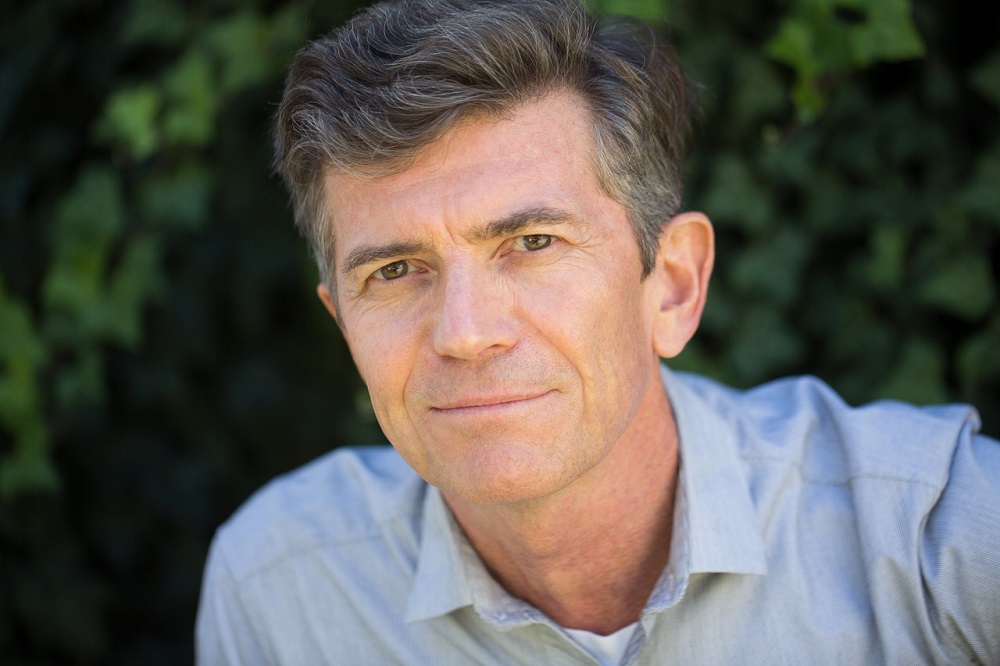 |
|
| photo: Sharona Jacobs | |
Stephen McCauley is the author of several novels, including The Object of My Affection, True Enough and Alternatives to Sex. His fiction, reviews and articles have appeared in the New York Times, the Washington Post, Harper's, Vogue and many other publications. He serves as co-director of creative writing at Brandeis University. My Ex-Life (Flatiron, May 8, 2018) is his seventh novel.
On your nightstand now:
The Sparsholt Affair by Alan Hollinghurst, Happiness by Aminatta Forna and The Sailor Who Fell from Grace with the Sea by Yukio Mishima. There are about 20 other books beside my bed, but these three I'm actually reading. I've been sampling quite a few 20th-century Japanese novelists lately, prompted by having read and loved The Makioka Sisters by Junichiro Tanizaki last summer. It was my favorite read of 2017.
Favorite book when you were a child:
Johnny Tremain by Esther Forbes. It's set in Boston during the American Revolution. I loved the historical background (Paul Revere and all that) and the streets and landmarks described in the novel were familiar to me. That said, I suspect the greatest appeal was having a crush on the sensitive, wounded main character.
Your top five authors:
In addition to all the writers I'm friends with: Dawn Powell, Alan Hollinghurst, Anita Brookner, Richard Price, Anthony Trollope.
Book you've faked reading:
Where to begin? Fifty Shades of Grey by E.L. James. I was giving a talk on current bestsellers and had to have an opinion. I struggled through 20 pages and figured my opinion wasn't likely to change if I read on. On the other end of the literary spectrum--and with a lot in between--I've faked reading Absalom, Absalom! by Faulkner. As you get older, faking becomes easier; you can claim faulty memory for specifics and no one presses you.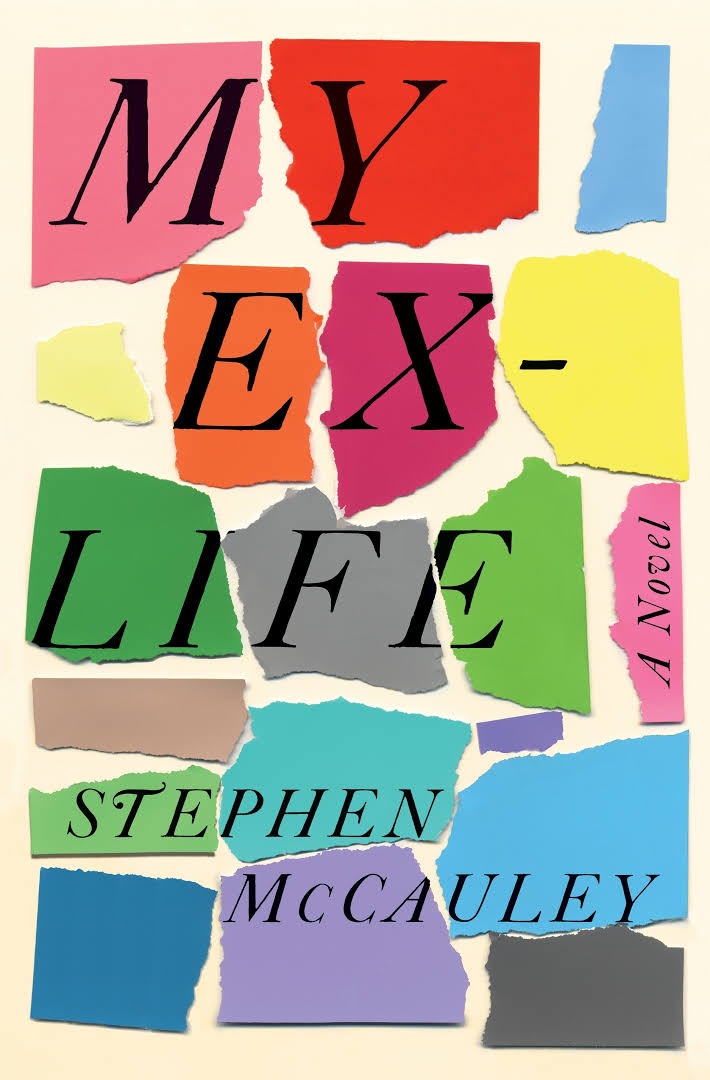 Book you're an evangelist for:
Book you're an evangelist for:
Can I mention an audiobook? Ruby Dee's reading of Zora Neale Hurston's Their Eyes Were Watching God is not only one of the best audiobooks I've ever heard but also a truly great feat of acting. Dee opened up new aspects of the novel for me, even after I'd read it on the page a couple of times. I'm always pushing it on people, especially people who claim they don't like audiobooks.
Book you've bought for the cover:
I'll buy anything published by New York Review Books. Yes, it's a well-curated collection, but the clean, pleasing, uniform design of their covers has a lot to do with what I find irresistible about the books. I love holding them in my hands and purchasing them, even when I suspect I won't read them.
Book you hid from your parents:
Valley of the Dolls by Jacqueline Susann. Of course, they also hid it from me, so it seemed like that's what you were supposed to do with it. I still have my mother's original paperback from the 1960s, and it's still hidden.
Book that changed your life:
Giovanni's Room by James Baldwin. It was the first novel about love between men that I read. It ends with tragedy, but as an isolated teenager, it made me feel I had a place in the world.
Favorite line from a book:
"She was forty-three--well, all right, forty-eight if you're going to count every lost weekend." That's from The Golden Spur by Dawn Powell. I especially love "well, all right." It sums up the character's attitude toward life and herself perfectly.
Five books you'll never part with:
The number is more like 500, but if you insist: Angels on Toast by Dawn Powell--probably not her best, but I love so many passages from it, it doesn't matter. The Fire Next Time by James Baldwin--I wish it were mandatory reading for all Americans. Lives of the Saints by Nancy Lemann--one of the nuttiest, most hypnotic novels I've ever read. Almost any sentence puts me in a state akin to fever dream. After Claude by Iris Owens--it's unspeakably audacious, outrageous, uneven and offensive. If you can get past all that, it's the funniest novel ever written. Madame Bovary by Flaubert. You can open it at random and read a paragraph that teaches you something important about writing. Since I never seem to learn the lessons, I need to keep it around.
Book you most want to read again for the first time:
Rosemary's Baby by Ira Levin. It terrified me in a very satisfying way when I first read it. I reread it recently and had great fun, but that initial shock wasn't there.
Book you wish had a sequel:
The Portrait of a Lady by Henry James. The last page of that novel is so upsetting to me I crave a sequel in which Isabel Archer has a decisively happy ending.
The Dependents by Katharine Dion (Little, Brown, $26 hardcover, 288p., 9780316473873, June 19, 2018)
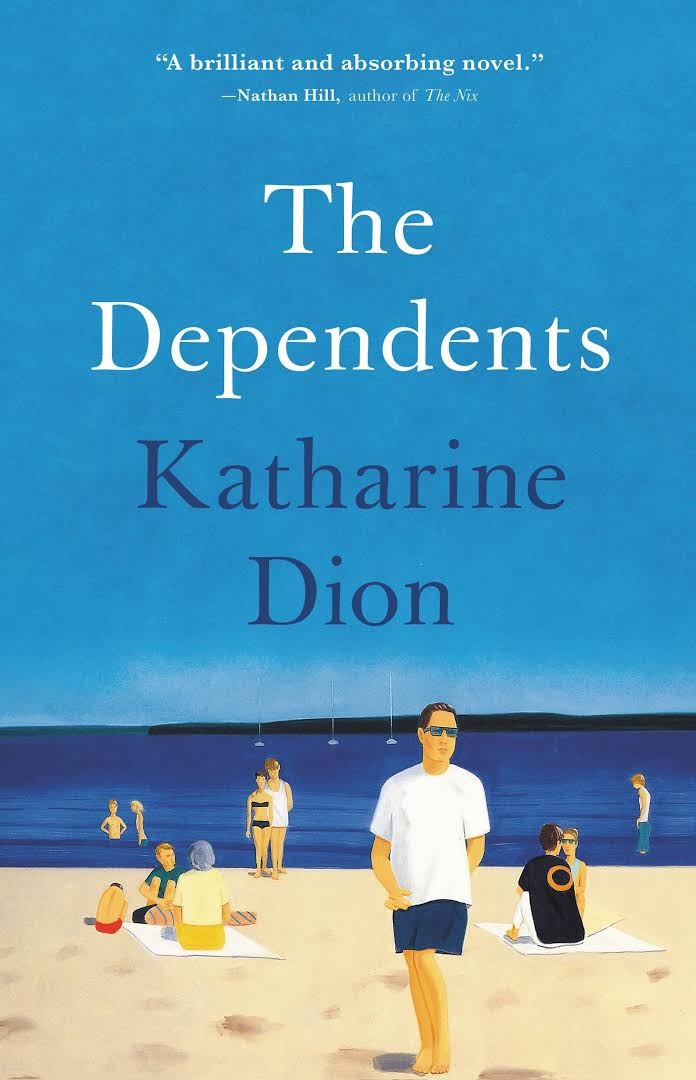 Katharine Dion's first novel, The Dependents, takes readers back to that high school standby play Our Town. Instead of Thornton Wilder's Grover's Corners, however, it plays out in the small former mill town Colton, N.H., where Gene Ashe is grieving over the death of his wife of 49 years from a post-knee surgery blood clot. Moody, forlorn, immersed in memories, Gene is looking for some sign that his rather humdrum life and marriage with Maida provided the happiness he had anticipated when he was a young man.
Katharine Dion's first novel, The Dependents, takes readers back to that high school standby play Our Town. Instead of Thornton Wilder's Grover's Corners, however, it plays out in the small former mill town Colton, N.H., where Gene Ashe is grieving over the death of his wife of 49 years from a post-knee surgery blood clot. Moody, forlorn, immersed in memories, Gene is looking for some sign that his rather humdrum life and marriage with Maida provided the happiness he had anticipated when he was a young man.
Gene wanders the streets of Colton alone, browses Maida's clothes and their household furnishings and reminisces about family summer vacations at their close friends Ed and Gayle Donnelly's lake house. He lets his intrusive California daughter, Dary, take over the funeral arrangements. Fearing that his and Maida's lives didn't add up to much, the best he can muster for her eulogy are four words: "something definite was lost."
Dion, an Iowa Writers' Workshop graduate and MacDowell Fellow, dexterously captures the warp and woof of small-town life. Through Gene's reflections on his past, readers learn of his smug, savvy college friend Ed's tutoring of him in the ways of dating and seduction--and introducing him to Maida. She hesitantly accepted his proposal, observing: "You're quiet, you're pleasant-looking, and you're kind to me." Once married, Ed and Gene and their wives became closer as they shared holidays and child-raising.
A physician, Ed had the money, the lake house, the world travels and his own contractor on call to handle the frequent upgrades to their house. Gene, however, took money from his father-in-law to buy a small retail shoe store which he dutifully managed for decades until it failed, like the mills--a victim of online shopping. While he imagined his customers "buying shoes at three in the morning in darkened rooms glowing sickly blue," he justified his life's work by reminding himself that at least "he had given people the opportunity to own a piece of craftsmanship they could use."
Living alone as a bereft widower in failing health, he reluctantly hires a caretaker--at Dary's insistence. When Adele enters his world, Gene finds welcome assistance as well as companionship. After a brief ill-fated romance with her, he seeks time to himself over a few winter weeks at the Donnellys' lake house reading Ed's college copy of Anna Karenina and pondering the mysteries of his marriage, his daughter, his friendship with Ed and the coming end of his life.
Though shaded in the melancholy of a lonely aging man, The Dependents is luminous in the telling. Like Wilder, Dion sensitively and humanely uncovers the ambiguities of life as manifested in the world of a small New Hampshire town. Gene assimilates these ambiguities and, in the end, understands "that the life he'd had--the defective one plagued with uncertainty and misunderstanding--this was the one he wanted after all." --Bruce Jacobs, founding partner, Watermark Books & Cafe, Wichita, Kan.
Shelf Talker: Katharine Dion's singular debut is a polished tapestry rich in character and insight.
Next week at BookExpo, we'll be talking about forthcoming titles and the future of the book trade, but for a moment let's consider the past, in the form of 5,600 hours of interviews Studs Terkel conducted for WFMT-FM from 1952 to 1997. The first installment has just been made available to the public.
Nobody listened to us better than Studs did.
In the archive I found a 1968 interview with the late British bookseller Una Dillon, founder of Dillon's University Bookshop in London. Listening to her talk about launching a bookshop 80 years ago became my unusual, if strangely appropriate, way to prep for BookExpo.
"I was a bookseller from about 1938," Dillon recalled. "I had an itch to own something of my own. It was a very rash thing to do because I gave up quite good job prospects. My father gave me £600 (about $800). I borrowed another £200. And with £800, I started to be a bookseller, which looking back on it seems to me quite mad.... I had a tiny shop, which I ran myself with one half-time person near the University of London because that was my idea. I thought they weren't being served with books enough in that area apart from our friends Foyles in Charing Cross Road, which is a good way away.
"So I settled down in this little shop. We went through the war in it. We got bombed on one side, moved across to the other.... And then in '56, the University of London bought some shop property just around the corner from where I was, and they wanted a big bookshop there. And they asked me if I would amalgamate with another local man. It would have been very good because he had all the knowledge, and I had perhaps the more fashionable side. But he didn't want it. So that fell through."
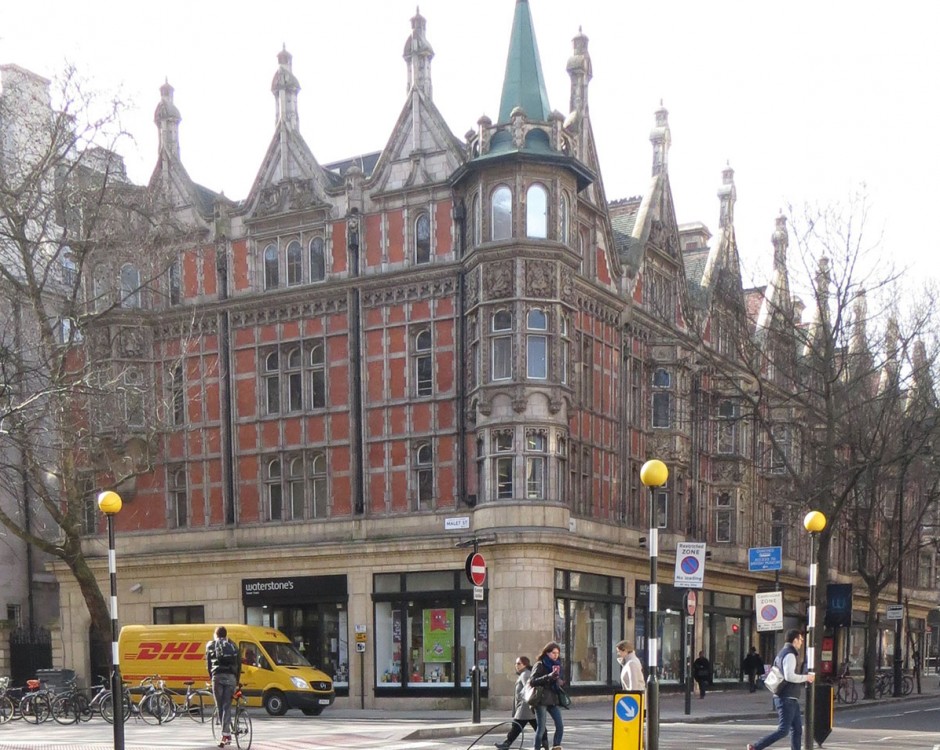 |
|
| Dillon opened the store in 1956, in a small area on the ground floor. The location is now a Waterstones. | |
After further inquiries elsewhere, the university "had to come back to me," Dillon said. "We started with a staff of about four, and I left it two months ago with a staff of 103. So, you can imagine; in 11 years that was terrific growth."
Dillon attributed her success partly to location: "It is a wonderful position right in the heart of several of the colleges, opposite the student's union. Also I think because I like students, I like the people, we wanted them. The atmosphere I hope has been one of welcome, you know, and a bit of warmth all the time. And I was lucky."
Although many of her colleagues complained that students during the late '60s no longer purchased books, Dillon countered: "I say this is absolutely wrong. There are a few of course who will never buy a book all their lives. They're not that type. But from personal experience, I've seen them in that shop, for instance, at lunch time. They're like round the honey pot in the paperbacks department.... They do buy books, and I get rather annoyed with the way that people run them down. I think they're an inquisitive generation. They want to know."
Her approach to bookselling will sound familiar to us: "A bookshop is not, to me, a supermarket. It's not somewhere where people go in, look round and pick up a book. There must be quite an amount of personal service in it, I think. Even if you don't have much time to talk to customers.... But it's something about the approach to customers. I think it's terribly important. And I think the danger is we're losing this here. You have people say, oh this is terribly extravagant waste of staff. Why don't you turn it into a great self-service store? All right, but to me that's not a bookshop."
Terkel wondered if the personal approach in retail generally was dwindling. "It is disappearing," Dillon replied. "I'm afraid, in a sense, it comes down to economics again, that if you're going to have personal service in a shop you must have the right people, the right type of staff, and you must let them have the time with which to be a bit personal. I think it can be done, but there are people in the trade who are almost against it and say it's an absolute waste of time and money and everything. Turn it into a great supermarket and let people look after themselves.... I don't mean to say you should worry people. I don't like as soon as you go into a shop somebody rushes up to you. It's very bad. You let people wander about.... You must like your customers, I think."
Her analysis of corporate threats to small business ("the trend of the times") echoes through the decades as well: "After all, it's the same trend you have in the last of the small grocers, in the domestic hardware stores. They're disappearing. I know why, because they can't afford to keep going. And it's all going into the hands of the big supermarket; and of course, you have the book departments within stores. Some of them are very good but it isn't the same to me as a bookshop."
She was prescient. Dillon's University Bookshop's Gower Street location is now a Waterstones branch featuring Dillons coffee shop. But I think she would have enjoyed the current indie bookstore renaissance. When she died in 1993, the Independent's obituary described Dillon as "a generous and kind person, with a personal gracefulness, but she also had a residual toughness that enabled her to succeed in what was then still a man's world of bookselling." Her spirit, in every sense of the word, will be my guest at BookExpo.